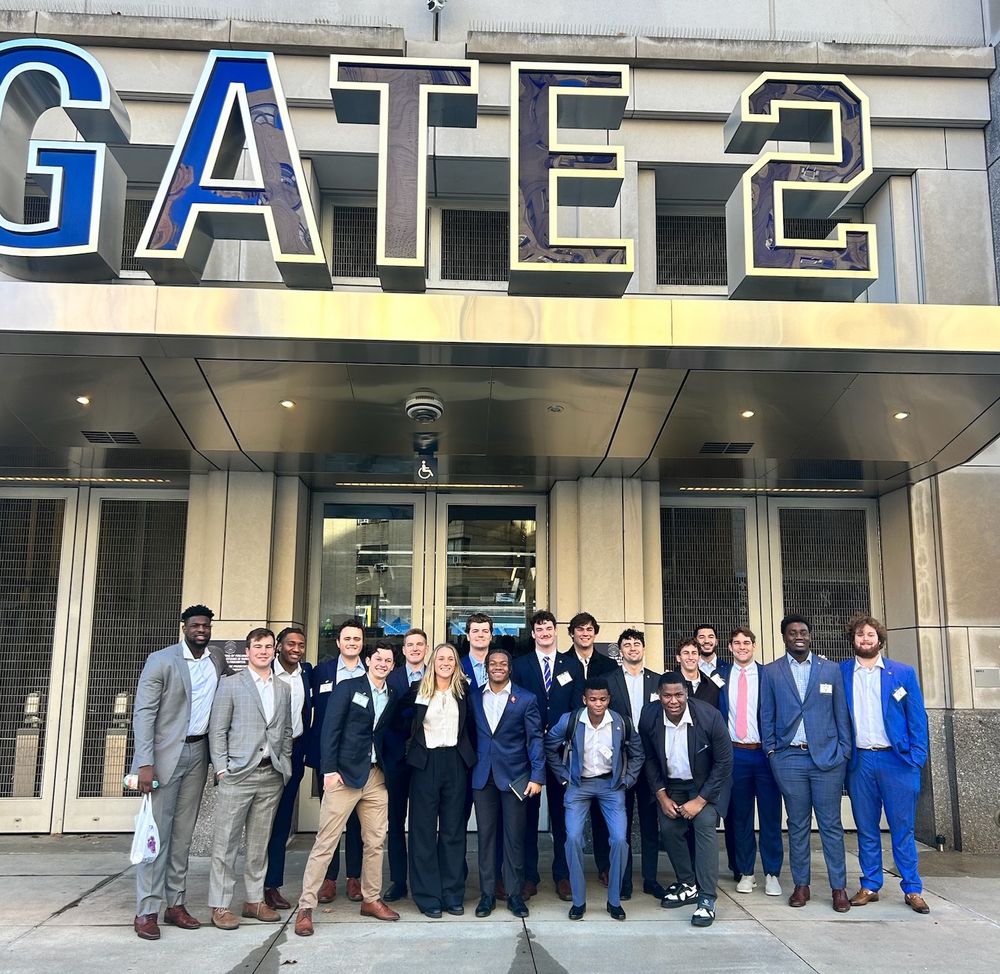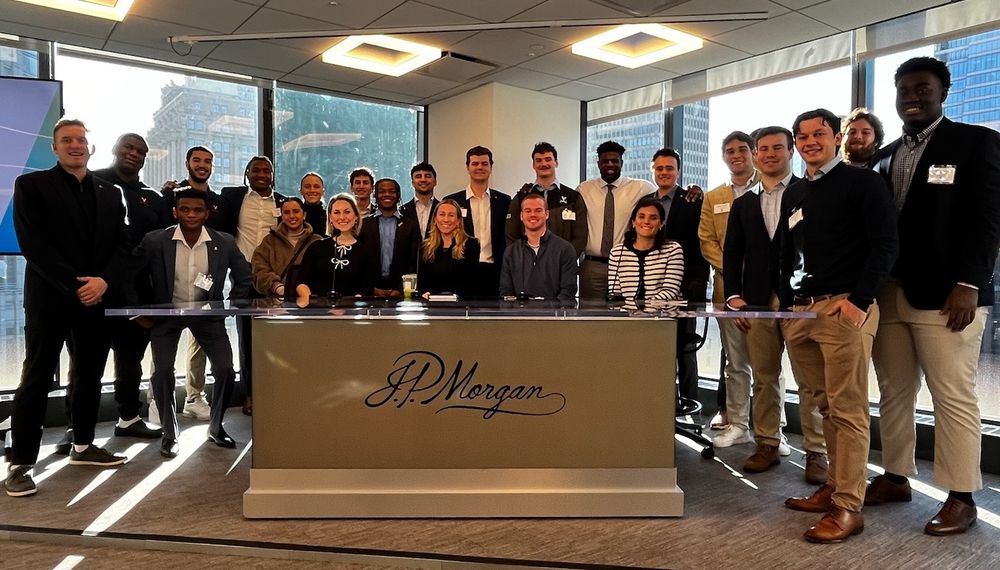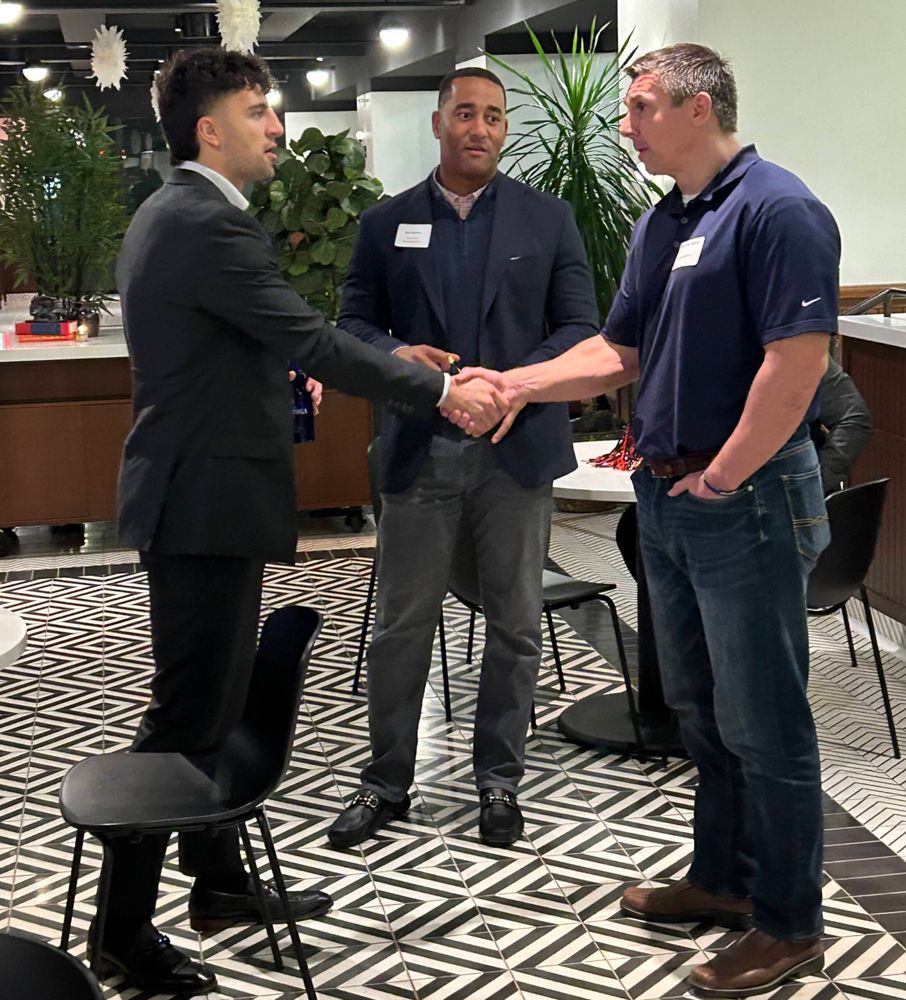NYC Trek Expands Student-Athletes' Horizons
By Jeff White (jwhite@virginia.edu)
VirginiaSports.com
CHARLOTTESVILLE, Va. — It’s known as The City That Never Sleeps, and so it was only fitting that a group of University of Virginia student-athletes had little downtime during a career trek to New York this month.
Over three days, the Cavalier contingent visited 12 sites—Yankee Stadium, J.P. Morgan and the offices of Major League Baseball and the National Football League among them—and also participated in a networking event with alumni from the New York area who had been student-athletes at UVA.
“It was definitely full and action-packed,” said Heidi VandeHoef-Gunn, director of career development for UVA Athletics. “There was not a dull moment.”
Six UVA teams were represented among the 21 student-athletes who convened in New York City on Jan. 9: football, baseball, field hockey, women’s squash, men’s soccer and men’s diving. The costs of transportation, lodging and meals for the group were covered “by a very generous donor who is focused on service and experiential learning,” Gunn said. “He wanted to provide these types of opportunities for our student-athletes to leverage their experience into entry-level roles and understand the power of networking on getting connected into some of these competitive industries.”
The student-athletes, who signed up for the trek because they were interested in working in New York City, visited three companies the first day: LinkedIn, the Bridge Lab and the NFL league office.
The second day featured stops at Yankee Stadium, Blue Owl Capital, AlphaSights and MLB, and on the student-athletes’ final day in the city they learned about J.P. Morgan, ESPN Contract Negotiation, Goldman Sachs, Masterworks and UPSTACK.
“It was a really nice variety of companies,” said Elias Norris, who played on the Virginia men’s soccer team in the fall.
A different UVA graduate served as the group’s contact at each site visit. Many of the hosts were former student-athletes, chief executive officers or senior-level professionals, including William Keys (football), CEO of the Harlem-based Bridge Lab, and Kimberly Fields (track & field), Senior Vice President for Football Operations with the NFL.
The companies were asked to highlight “all the different types of roles they have within their entry-level opportunities and potential for growth down the road,” Gunn said.

Outside Yankee Stadium
Keys and his wife, Shaba, founded the Bridge Lab to assists students who want to pursue creative or business roles in the entertainment industry. They hosted the Virginia group at Little Stranger Inc., the production company of UVA alumna Tina Fey.
“We were happy to do it,” William Keys said, “and we hope that it becomes a regular thing.”
To the student-athletes, Keys said, he and his wife explained “that just about any job in any industry, across the board, also exists in the entertainment industry. You could want to be an accountant, a doctor, a teacher, a construction worker, working in the automotive industry, etcetera, etcetera. All of those things exist in the entertainment industry, and particularly young people, but most people outside of that industry, don’t realize that. The entertainment industry tells stories and recreates worlds whether they’re in the past, the future or the present. Someone has to make everything in that world, and then someone has to service all of the people who are doing that work.”
Many of the student-athletes they met are “interested in data analytics, commerce, finance,” Keys said, “and we were informing them and teaching them that money has to be raised to create stories in the entertainment industry. Accountants and finance people are incredibly important or else the creatives can’t do what they’re supposed to do. And the programming and the thought and the strategic planning necessary for having a successful company or a successful project falls in line with their interest and I think they were pleasantly surprised and it was helpful for them to learn that they don’t only have to pursue Wall Street or accounting firms or business pursuits. All of those things are within our industry as well.”
The lessons he learned as a student-athlete at the University, Keys said, have served hm well professionally.
“I have a different threshold for work, I think, because of the discipline that I developed during my years of undergrad [as a student-athlete],” he said, “and because of the expectations and what we had to do. We were essentially working just about full-time jobs—maybe slightly less hours, but not by much—going to school [and playing football], and the hardships and the focus that it took absolutely better prepared me for anything that’s considered quote-unquote tough in the workplace. It’s not the same level. And so whereas I think a lot of my peers have a much lower bar for a tough day … I know that student-athletes, again, because of the stringent requirements and the load they carry, when getting out into the workplace, they’re very well-adapted to and have a different meter for what is challenging.”
Fields earned two degrees in systems engineering at UVA, a bachelor’s and a master’s. Balancing her undergraduate work with her track & field career required self-discipline and time management skills, and that’s helped her professionally. “They all apply,” Fields said.
She cited the NFL’s response to the COVID-19 pandemic in 2020 and how the league was able to play games that fall while protecting its teams and their fans.
“It was of those moments where teamwork and the things you learn as an athlete really come into play,” Fields said. “It was one of those great unknowns for all of us, but we knew that there were multiple solutions to get through the season and we were able to figure it out.”
For the site visit to the NFL office, Fields said, she tried to line up speakers who aligned with the student-athletes’ majors and interests.

At J.P. Morgan
Norris said it was enlightening “to ask these employees how different skills and character traits from being an athlete in general translate into certain positions.”
Norris transferred to UVA last summer after graduating from George Washington University, where he received a bachelor’s degree in political science. He’s on track to earn a master’s from the School of Education and Human Development in May.
Pro soccer is an option for Norris, but he eventually plans to work in the business world, and the career trek “confirmed that I want to be in New York after I graduate,” Norris said.
The trip to New York underscored what a strong alumni network UVA has, Norris said. “It’s nice to meet people who, A, went through the same experiences as you and can talk about it and, B, who are working at firms that you want to be at. They understand where you were before and they know where you want to be.”
Adele Iacobucci, who wrapped up her superlative field hockey career in November, is in her final semester of the M.S. in Commerce program at UVA. She appreciated the “large breadth of industries” the group visited in New York. “To be able to get that kind of exposure, especially connecting directly with former student-athletes, was just amazing,” Iacobucci said, “and I really think it will help me in my job search now. It was pretty eye-opening, honestly. I’ve never been in any of these offices in person. It was a great experience.”
Among the football players on the trip was quarterback Tony Muskett, who transferred from Monmouth University to UVA last January. Like Iacobucci, he raved about the experience.
“I was telling some of the guys in the locker room that they’ve got to sign up next year when the time comes around,” Muskett said. “It was definitely really beneficial.”
Three stops stuck out to Muskett, a sociology major who hopes to work in the business world when his football career ends. The group visited the Empire State Building to learn about LinkedIn, and he also enjoyed seeing Times Square and touring Yankee Stadium.
“Just being in the city in general, a lot of it was pretty surreal,” Muskett said. “So having an opportunity like this to go to New York was great. We met with a wide range of industries, whether it was banking, business, management. We talked to investment teams, acquisition teams, so it would be really cool to do anything along those lines in the city.”
At the networking event, held in the One Vanderbilt building in Manhattan and funded separately by a Virginia Athletics Foundation donor, the student-athletes had an opportunity to talk with multiple generations of UVA alumni.
“Some of the people there were 24, 25 years old, and some of the guys were 60, 70,” Muskett said. “Super diverse. I got to hear from a lot of different people, met a lot of new, interesting people and made some connections. It was definitely a once-in-a-lifetime experience.”
The networking event was Iacobucci’s favorite part of the New York trek.
“It kind of felt like a little team meeting.,” she said. “We came together [before the event] and all put our hands in. It felt like a team in that sense because we were going to go out and talk to a bunch of people. And then after it ended, we all came up and did a recap. I’m extremely grateful for Heidi for putting that all together. I got to meet a lot of cool people, but I also felt like [the student-athletes] were my team.”
Gunn said the networking event was intentionally designed to help student-athletes “get connected within their career paths and learn from alumni how to transition out of their sport and into those specific fields.”
Muskett, who roomed with Luke Schauer from the baseball team, enjoyed interacting with fellow students from different sports.
“UVA is a big school, with a big student body,” Muskett said, “so it can be difficult sometimes to meet athletes from other sports and connect. It was definitely a cool experience to spend a couple days with them and get to know them a little bit.”
Gunn said the athletics department is grateful for the donor and alumni support that provides “this type of impactful experience for student-athletes, where they connected across sports through significantly enhanced industry exposure and developed professional relationships with our strong student-athlete alumni base. What a way to spend J-term!”
To receive Jeff White’s articles by email, click the appropriate box in this link to subscribe.

Tony Muskett (left) with football alumni Barry Simmons (center) and Andreas Karelis

